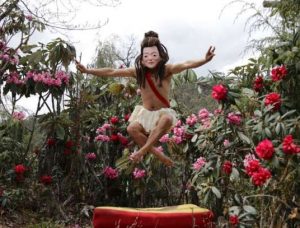Shambhala Publications released Composting Our Karma: Turning Confusion into Lessons for Awakening Our Innate Wisdom by Barbara Rhodes (also known as Zen Master Soeng Hyang) in December 2024.
This sweet-spot-sized volume is ideal for reading and rereading without it feeling either too short or overwhelming—especially for those new to inner alchemy or curious about Zen. The approach here is something akin to Jung’s shadow work, combined with the insights of Eckhart Tolle and Ram Dass’s Be Here Now, without being overly esoteric. Rather, the author uses composting as her underlying analogy, and one can’t be more down-to-earth than that!
Composting Our Karma is both personable and friendly, feeling as if we’re learning directly from a teacher at Rhodes’s Dharma center. Which is to say that this is very much a book that leans into the teachings of Rhodes’s own teacher, Master Seung Sahn, and many of his philosophies, the offerings of her center, and the retreats that she advocates. But beyond the focus of a purely Zen approach to living, Rhodes visits some of the core principles that transcend spiritual traditions. Key among them is the idea of believing in oneself and returning to the primary point that serves as a grounding reminder for all who embark on this journey.
And now, a few thoughts about the primary point and the way it’s advocated. Arguably, this is something that some may call “instinct” or “communication with the void”—the source of information that we can access in the moment without thought. Equally, there is a misconstrued understanding of koans and crazy wisdom teachers: that the in-the-moment, non-intellectual non-sequitur responses are a sign of enlightenment. Obviously, this can be an open invitation to all sorts of inappropriate behaviors, however moving from “clever” to “wise” and then beyond the constraints of labels and predications is the true aim.
In some respects, this approach seems to contradict how we are taught to respond rather than react, which can be an outcome of many unconscious factors. Reacting impulsively can be considered problematic as it allows unfettered feelings to lash out, while adopting a more mature response can mitigate escalation of a volatile situation. However Rhodes caveats with this: “If you just do what you’re doing out of compassion and out of complete selflessness, then your particular personality or style doesn’t matter.” We shouldn’t need reminding of this, but it’s important as no one should advocate immature aggression or hedonism as simply “being in the moment.” Sure, the idea of being true to oneself is important, but that’s based on the assumption that one isn’t a sociopathic sadist.
The primary point seems to be more about creating a clear mental channel. Using a radio as a metaphor for our mind, and tuning into the primary point seems to be like turning the dial to a static-free frequency that enables us to more easily become the receiver and transmitter. Children do appear to be pretty unfettered in this respect, very in-the-moment. They say things as they see or feel them. But throwing a tantrum in the middle of a shopping aisle because of the apocalyptic feeling of not having that all-important toy or candy isn’t particularly helpful.
While the pursuit of an awakened mind is the goal, being in the moment and being kind are things that many people do without a hint of spirituality or religion—a reality that Rhodes acknowledges. In fact, I’d argue that rescue workers and care workers (and I include raising children) are often kinder humans than those that place themselves on a spiritual pedestal.
It behooves us, then, to make the necessary effort when we know that self-awareness and improvement are required; for some this is a retreat. Rhodes herself admits that, when it was suggested that she may benefit from a 100-day retreat, leaving her child was very difficult. My own thoughts on leaving young children for a retreat aside, learning and becoming one with the present moment, the only reality we can ever truly experience, is clearly of great benefit when done with conscious compassion. We are otherwise slaves to our conditioned mind. There are many esoteric and religious terms for our mental proclivities, but much of this can also be explained by neuroplasticity.
Rhodes shares a basketball analogy that is useful at explaining neuroplasticity and breaking down our habits. My leaning is toward science (yes, I’m aware of the limitations of the worst aspects of science, but I mean it in the archaic sense—accruing knowledge of any kind), and asking questions, which is another valuable aspect of Rhodes’s book: the question of who we are and why we do. The quiet motivations that propel us to behave in certain ways, yet to which we remain blind: knowing means that we can address things, and this is a key point of shadow work and inner alchemy. Being aware of what is and why, and from whence it came, means being better equipped to transmute negative aspects into something useful. This is what Rhodes is getting at in her book and her composting analogy. And it’s a technique of which I’ve certainly made use. This is about breaking the habit of who we’ve become to permit our divine nature to shine through, although I also offer the caveat of not indulging negative actions under the guise of “living in the moment.”
Of course, situations in life can sometimes feel unbearably challenging. Yet when we try to view them as a crucible that results in something improved, it can help. Leaning in is a powerful way of letting us feel something as much as we need to feel it in order to reach the other side. Developing preemptive awareness is also an act of kindness, as it helps us learn and grow without causing suffering to others in the process.
We must take a realistic rather than idealistic approach to spiritual growth. While some people actively pursue self-awareness and personal development, many remain chained in Plato’s allegorical cave, either maintaining basic decency or acting without conscious consideration of others. Although a single short book or teaching cannot address every individual’s circumstances, spiritual teachers must remain mindful of this reality in their work. They must also carefully examine their own biases to avoid cherry-picking examples or evidence that merely confirm their existing beliefs.
All in all, Composting Our Karma is particularly suited to those new to inner alchemical concepts of transforming everyday situations through the practice of Zen. The book’s teachings are delivered in a warm and friendly manner, making them accessible for everyone.
See more
Composting Our Karma: Turning Confusion into Lessons for Awakening Our Innate Wisdom (Shambala Publications)
Related features from BDG
Book Review: The Free Mind: Finding Clarity in a Digitally Distracted World by Dza Kilung Rinpoche
Book Review: The Intimate Way of Zen by James Ishmael Ford
Book Review: A Meditator’s Guide To Buddhism by Cortland Dahl
















